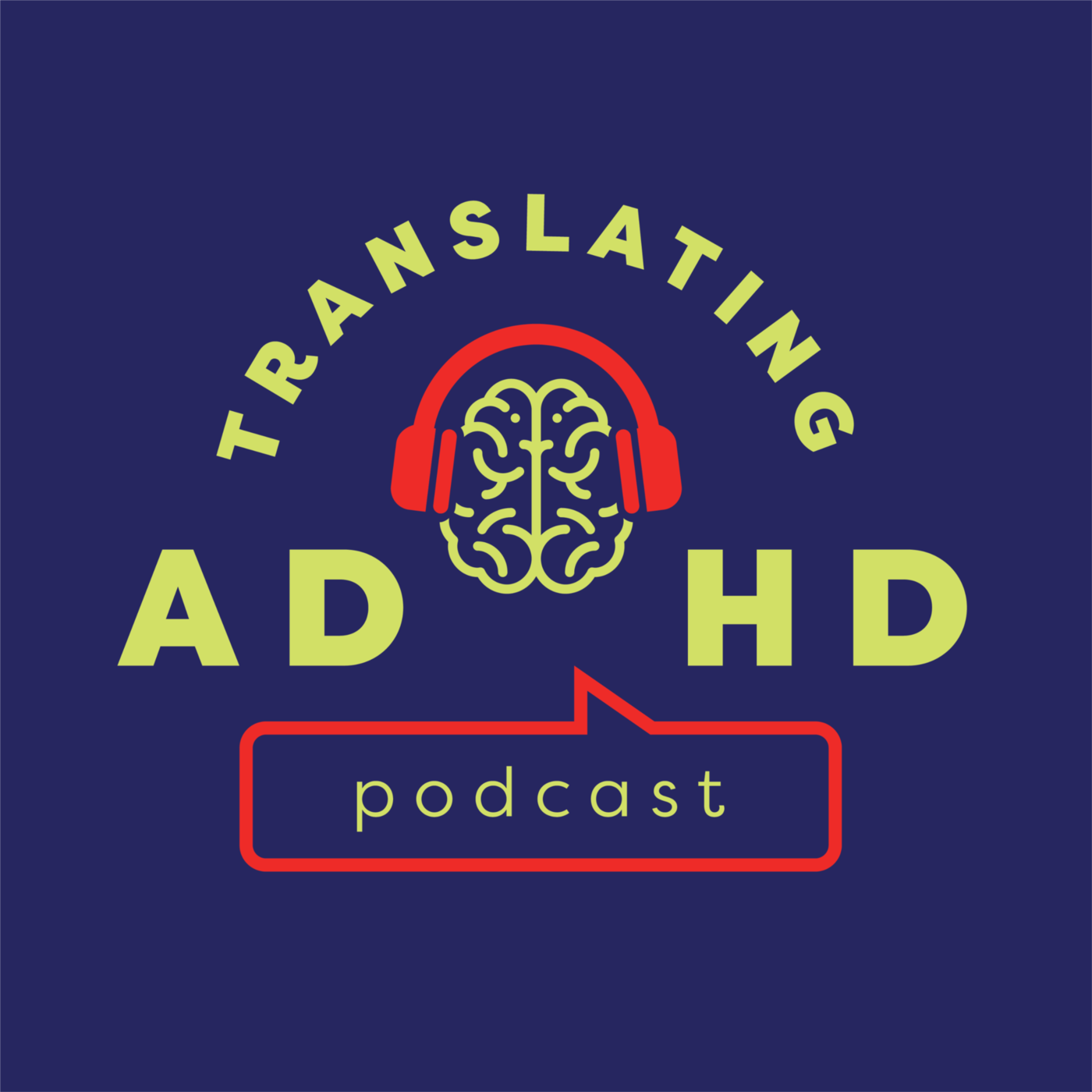
1.4M
Downloads
268
Episodes
We believe that success with ADHD is possible... with a little translation. Hosts Asher Collins and Dusty Chipura, both ADHD coaches who have plenty of insight to share navigating their own ADHD experiences, discuss how to live more authentically as an adult with ADHD and how to create real, sustained change to achieve greater success. If you are an adult with ADHD who wants more out of their business, career, and life, this is the podcast for you!
Episodes
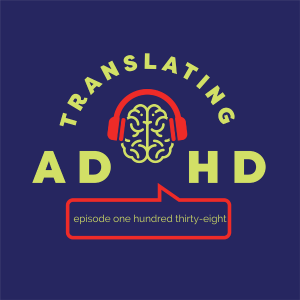
Monday Jul 25, 2022
Translating ADHD Reflections
Monday Jul 25, 2022
Monday Jul 25, 2022
As season two comes to an end, Cam and Shelly reflect on their learning over the last year in hosting the podcast together. Cam appreciates the focus on practice in the episodes and reflects how he is using this approach to develop a lighter touch on moving his own initiatives forward. Shelly shares how she let go of pursuing or achieving “at the speed of capitalism” and regaining an important perspective on what matters most for her - to have more balance in her life.
Both hosts share about what they are looking forward to in the next season starting September 19th - more in-depth exploration of lived experiences, especially the interplay of ADHD and other conditions like anxiety and depression. Cam is also considering tinkering with the Mt Rainier Model. Cam has picked seven archived episodes for the break. Shelly and Cam invite listeners to listen and catch up or to also take a break and rejoin them in September.
Episode links + resources:
For more of the Translating ADHD podcast:
- Episode Transcripts: visit TranslatingADHD.com and click on the episode
- Follow us on Twitter: @TranslatingADHD
- Visit the Website: TranslatingADHD.com
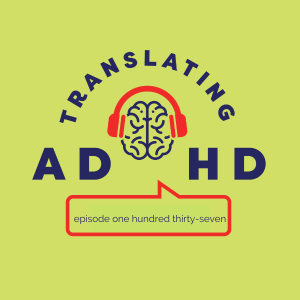
Monday Jul 18, 2022
ADHD Interplay Overview: Physical Pain
Monday Jul 18, 2022
Monday Jul 18, 2022
Individual context matters and no more when we start to look at the interplay of ADHD and other areas of challenge like trauma or depression. A recent Canadian study that reveals factors and obstacles to succeeding with ADHD is the prompt for this week’s episode. Cam and Shelly talk about how listeners can read between the lines of a study and look for information that is actionable.
At first glance the study reveals fixed qualities like gender and marital status that contribute to happiness and satisfaction with ADHD. Looking deeper we see the impact of comorbid conditions, trauma, history of abuse and chronic pain, and the importance of support in these areas.
Cam uses his recent back injury to highlight the interplay of ADHD and pain. ADHD is often an X-factor when it comes to managing other challenges, exacerbating something like depression or deepening a depressive event. Cam and Shelly talk about the significance of effective supports and what happens when those supports are taken away. Those of us with ADHD tend to downplay the challenge or whether we deserve to address the core issues. This is just the start of exploring the interplay of ADHD and individual context.
Episode links + resources:
Summary of Canadian Study -
https://link.springer.com/article/10.1007/s41042-022-00062-6
ADDA Event -
https://homecoming.add.org/
For more of the Translating ADHD podcast:
- Episode Transcripts: visit TranslatingADHD.com and click on the episode
- Follow us on Twitter: @TranslatingADHD
- Visit the Website: TranslatingADHD.com
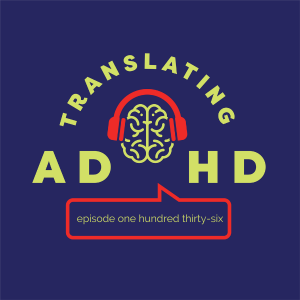
Monday Jul 11, 2022
Monday Jul 11, 2022
This week we are delighted to present another special episode dedicated to exploring the lived experiences of people of color with ADHD by presenting an interview with ADHD coach Marc Almodovar.
Along with being a coach, Marc is an advocate for men’s mental health and runs a support group for men with fellow mental health advocate John Hazelwood. In this episode, Marc speaks about his own challenges growing up with ADHD and depression in a Hispanic community wary of mental health issues. Marc shares how his own diagnosis at 16 changed everything for him, answering so many questions, and how he found support and encouragement from his similarly wired father. Marc discusses with Cam how his desire to change the narrative on men’s mental health inspired him to share his own story of struggle and resilience and how the power of a supportive community is essential to real change.
Join us in this fascinating, inspiring and far-ranging discussion with Marc Almodovar. Marc’s attitude and enthusiasm will carry you through the rest of your day!
Episode links + resources:
- Marc’s Twitter feed
- ADHD Men’s Support Group
- Advocate Kofi Obeng Interview
- ADHD Parent Advocate Rhashidah Perry Jones Interview
- ADHD Coach Inger Shaye Colzie Interview
- Join the Community | Become a Patron
- Our Process: Understand, Own, Translate.
- About Cam and Shelly
For more of the Translating ADHD podcast:
- Episode Transcripts: visit TranslatingADHD.com and click on the episode
- Follow us on Twitter: @TranslatingADHD
- Visit the Website: TranslatingADHD.com
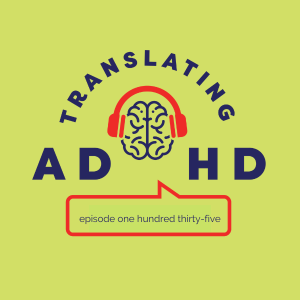
Monday Jul 04, 2022
Green Light Planning with ADHD
Monday Jul 04, 2022
Monday Jul 04, 2022
Hosts Shelly and Cam explore green light planning this week. This is a very specific example where expectations can go awry. Green light planning is a fascinating phenomenon and is the result of several ADHD challenges. It is when we predict the most favored outcome for some future event like catching a plane with time to spare. Most people will point to challenges with time estimation. Look closer and you can see more going on here.
Cam shares the example of a client trying to get to the airport and more often than not missing the departure. The client struggled with time estimation but also perpetuated a belief that he could better his best time. Furthermore, he failed to anticipate any potential delays or obstacles. Those of us with ADHD struggle to sense and anticipate variations of an outcome we create in our brain, especially the periods between events - the time between the shower, packing and eating breakfast. Specifically, this is a challenge with planning for transitions - both planned and unplanned. Emotionally we can engage in a mini ‘Zig Ziglar’ positive thinking exercise with the belief that our positive energy will somehow open an express lane to our destination. This is actually more of an emotional auto-pilot move to lock out unsavory thoughts if we are not successful in our plan.
Shelly counters with her own example of ‘Red Light Planning’ and the idea of a time optimist or time pessimist. The hosts leave listeners with an exercise to have a different experience with green light planning.
Episode links + resources:
For more of the Translating ADHD podcast:
- Episode Transcripts: visit TranslatingADHD.com and click on the episode
- Follow us on Twitter: @TranslatingADHD
- Visit the Website: TranslatingADHD.com
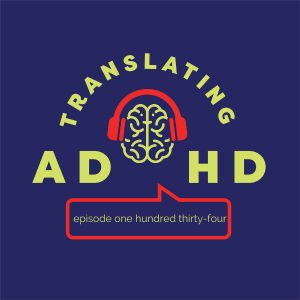
Monday Jun 27, 2022
Managing Expectations in Romantic Relationships with ADHD
Monday Jun 27, 2022
Monday Jun 27, 2022
The hosts continue exploring expectations, shifting to personal relationships this week. Cam takes the lead sharing dynamics that he sees from his Melissa Orlov coaching classes. The same habitual responses are in play in personal relationships as they were in last week’s episode on expectation and work. Add the dynamics of emotional investment and less defined roles, and the result is more contentious engagements with more emotional flooding by all parties.
Cam and Shelly believe that many of the conflicts that come to a head in any romantic relationship often start with ill-defined expectations – that the partners at some point divert on their own picture of success. Shelly and Cam share multiple client examples to illustrate this point. They point to the opportunity to see expectation as a conversation starter, for partners to develop a shared language around feelings and expectations. It’s not about compliance or getting on the same page as much as appreciating the other’s perspective. Often ADHD is viewed as a convenient nemesis of a healthy relationship. ADHD is in play, but it never acts alone. All parties have their own work to do, and once everyone agrees to this principle then real change can occur. Cam and Shelly leave listeners with some steps to address expectations proactively.
Episode links + resources:
For more of the Translating ADHD podcast:
- Episode Transcripts: visit TranslatingADHD.com and click on the episode
- Follow us on Twitter: @TranslatingADHD
- Visit the Website: TranslatingADHD.com
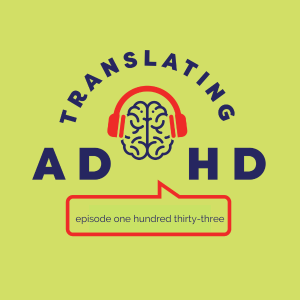
Monday Jun 20, 2022
Managing Work Expectations with ADHD
Monday Jun 20, 2022
Monday Jun 20, 2022
Shelly and Cam do an abrupt right turn with expectations, from camping in the woods on Phish Tour with Shelly to the environment and demands of work. Wherever there are people there are expectations, and wherever there are expectations there are different interpretations of those expectations. Burnout is actually an indicator of mismanaged expectations. ADHD makes it really tough to distinguish the priority of competing demands, and we often falter when we sense conflicting expectations.
Shelly and Cam explore a few client examples of habitual responses (from last week) and what the clients did to have a different experience with expectations. Using a colorful metaphor from a previous episode of ‘too many tennis balls coming over the net’, Shelly’s client resources her new manager to take a look at all of the end-of-school-year incoming demands and to prioritize and make an action plan for a ‘successful return volley’. The common theme is noticing the expectation and your own response to it. Shifting expectations from an ‘immutable truth’ to actually what it is - a point of engagement for dialogue.
Episode links + resources:
For more of the Translating ADHD podcast:
- Episode Transcripts: visit TranslatingADHD.com and click on the episode
- Follow us on Twitter: @TranslatingADHD
- Visit the Website: TranslatingADHD.com
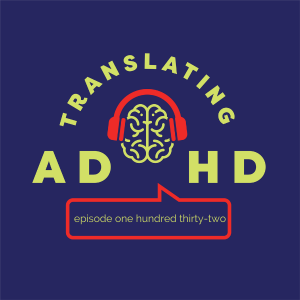
Monday Jun 13, 2022
Habitual Responses to Expectation with ADHD
Monday Jun 13, 2022
Monday Jun 13, 2022
Shelly and Cam continue on the theme of habitual responses by looking at expectations. An expectation is basically a belief that something will happen at some future date. You can appreciate how expectations may be problematic for those of us with ADHD - the delivery of something at some future point in time. Time estimation and struggles with activation go hand in hand here. So it makes sense we can develop some not-so-helpful responses to expectation.
Cam shares three examples - ‘running the flag up the flagpole’, where we elevate our own expectations and ‘do whatever it takes’; ‘bristle and defy’ where we reject any expectation outright; and an emotional shame response where we go to our one-down position. There are more responses, and Shelly and Cam invite listeners to think about their own responses to expectation. Shelly, fresh from a Phish tour weekend, adds the colorful examples for each scenario from setting up the campsite to challenges approaching our Discord server.
Through discussion, the hosts reveal a useful process of getting awareness and perspective on the expectation, identifying our own relationship and response to the expectation, stepping back and releasing any attachment to the expectation, and then using the experience as a point of discussion to clarify and reflect on the experience to build a better relationship going forward.
Episode links + resources:
For more of the Translating ADHD podcast:
- Episode Transcripts: visit TranslatingADHD.com and click on the episode
- Follow us on Twitter: @TranslatingADHD
- Visit the Website: TranslatingADHD.com
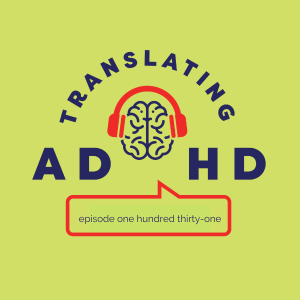
Monday Jun 06, 2022
Habitual Responses to Time with ADHD
Monday Jun 06, 2022
Monday Jun 06, 2022
Last week Cam and Shelly talked about habitual emotional responses to the stories we tell ourselves. This week they explore habitual responses in the context of time. Those of us with ADHD can have a complicated relationship with time. We can be extremely reactive to it, and we can be highly avoidant of it.
Today the hosts share client examples of some classic habitual responses to time. Shelly and Cam reference the Eisenhower Decision Matrix tool that distinguishes importance and urgency in a task, especially Quadrant I items that are important and urgent and the ever-challenging Quadrant II items that are important and not urgent. With ADHD just ‘scheduling’ our important items in the future is not enough. We have to first address the propensity to be drawn to the biggest signals - lit up by urgency and our level of interest.
Shelly leads off with her own client example where her client struggled with scheduling the all-important case notes in her role as a special education teacher. As Shelly and her client start to look for the “big chunks” of time the client starts to shift her perspective, not only seeing the time but how the time would be valuable to address much more relevant tasks. In doing so, Shelly’s client noticed and shifted away from her habit of thinking she needed big chunks to finish her notes. Cam follows with an example where the client’s habitual response is to avoid undefined but less urgent tasks, pushing them to the next day on his calendar. These self-described “black boxes” were a source of underlying anxiety for Cam’s client. But when the client let go of not knowing and embracing a narrow role of just assessing and defining the task, he could overcome his avoidant behavior. In both examples, the clients got curious and present to the opportunity at hand. Cam and Shelly leave listeners with some simple practices to start identifying and shifting habitual responses to time.
Episode links + resources:
For more of the Translating ADHD podcast:
- Episode Transcripts: visit TranslatingADHD.com and click on the episode
- Follow us on Twitter: @TranslatingADHD
- Visit the Website: TranslatingADHD.com
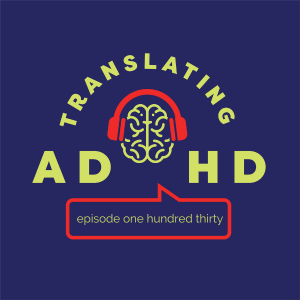
Monday May 30, 2022
Emotions and Stories: Getting to What is Real with ADHD
Monday May 30, 2022
Monday May 30, 2022
As a part of our trusting my brain theme, Shelly and Cam explore two client scenarios to illustrate the difference between the stories we tell ourselves and our emotional responses to those stories. The emotions we feel at any time are very real and dictate how we move forward in both thought and action. Stories that we tell ourselves are both real and not necessarily real. They can be informed by a past traumatic event as illustrated in our first client scenario or they can be based in a false belief as illustrated in the second one.
ADHD makes it very difficult to distinguish what is real and what is conjecture. They share how the mindfulness practice of getting present and curious introduced in episode 129 can be used to explore stories aided by ADHD that can elevate or ratchet up the meaning of an event or belief and conversely stories that can downplay or dismiss a specific need. Developing a sense of agency in the face of strong emotions and the compelling stories we tell ourselves is possible with the right support.
Episode links + resources:
For more of the Translating ADHD podcast:
- Episode Transcripts: visit TranslatingADHD.com and click on the episode
- Follow us on Twitter: @TranslatingADHD
- Visit the Website: TranslatingADHD.com
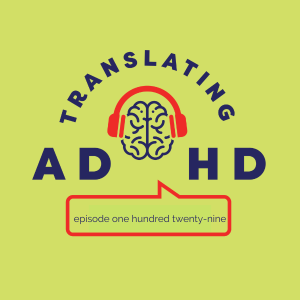
Monday May 23, 2022
Mindfulness on My Own Terms with ADHD
Monday May 23, 2022
Monday May 23, 2022
There is a plethora of scientific data to support the effectiveness of mindfulness in managing one’s ADHD. Lydia Zylowska M.D. has done some excellent research to prove this. Yet many people with ADHD have mixed feelings about the practice, especially the frustration of not being able to do it ‘the right way’.
Cam and Shelly explore mindfulness in the context of orienting to the full impact of one’s experience. They discuss how mindfulness can be packaged like any other prescriptive offering with the off-putting instruction to “just start by sitting still and focusing on one thing…” Cam and Shelly break mindfulness down into its essential components of presence and curiosity and how both can be difficult to achieve with ADHD yet valuable in the process of overcoming the first barrier of awareness.
They discuss the benefits of informal practices of getting present and curious using body awareness techniques and exercises that provide beneficial context. Shelly shares how listeners can utilize our Pause, Disrupt, Pivot process to create space in the gap between stimulus and response. Finally, Cam shares how mindfulness can be helpful to reflect on a challenging experience to extract the learning to apply at some future time.
Episode links + resources:
For more of the Translating ADHD podcast:
- Episode Transcripts: visit TranslatingADHD.com and click on the episode
- Follow us on Twitter: @TranslatingADHD
- Visit the Website: TranslatingADHD.com
